-
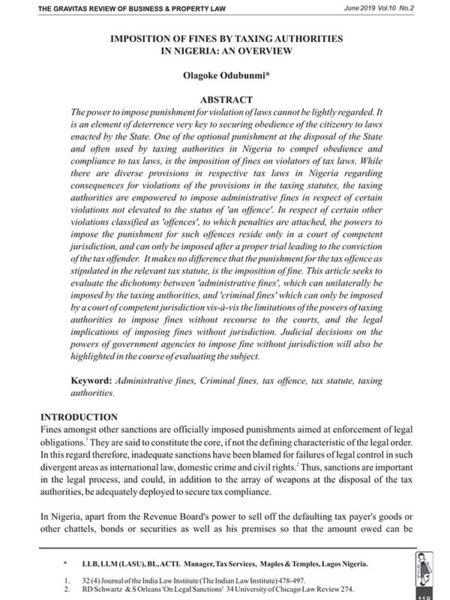
Imposition of Fines by Taxing Authorities in Nigeria: An Overview
0₦2,500.00Olagoke Odubunmi, Manager, Tax Services, Maples & Temples, Lagos Nigeria in his article, Imposition of Fines by Taxing Authorities in Nigeria: An Overview makes a distinction between ‘administrative fines’, which can unilaterally be imposed by a taxing authority, and ‘criminal fines’ which can only be imposed by a court of competent jurisdiction. He considers the legal implication of taxing authorities imposing fines without jurisdiction and concludes with a review of judicial authorities on the powers of government agencies in the imposition of ‘criminal fines’.
-
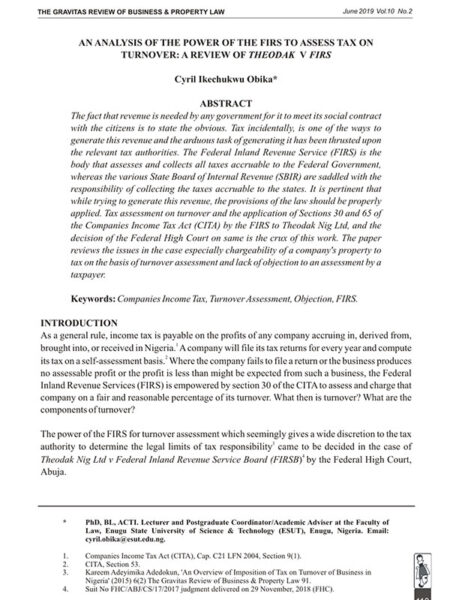
An Analysis of the Power of the FIRS to Assess Tax on Turnover: A Review of Theodak v FIRS
0₦2,500.00Dr Cyril Obika of the Faculty of Law, Enugu State University of Science & Technology, Enugu Nigeria in his article, An Analysis of the Power of the FIRS to Assess Tax on Turnover: A Review of Theodak v FIRS posits that ordinarily the FIRS, under section 9 of the Companies Income Tax Act 1961 as amended (CITA) charges to tax the profits of a company on its income> accruing in, derived from, brought into, or received in Nigeria. Exceptionally, under section 30 CITA the FIRS may charge a ‘fair and reasonable percentage’ of the turnover of a company to tax where there is no assessable profit or the profit is less than expected of such a business. Again, the FIRS under section 65 CITA may use its ‘best of judgment’ to assess tax where a company fails to file a return. Can the property of a company let to tenants be its turnover? Dr Obika examines the interrelation of sections 9, 30 and 65 of the CITA in his review of Theodak v FIRS.
-
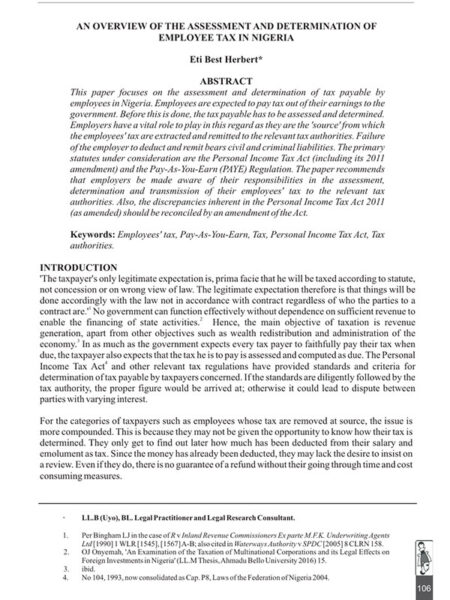
An Overview of the Assessment and Determination of Employee Tax in Nigeria
0₦2,500.00Eti Herbert, Legal Practitioner and Researcher in his article, An Overview of the Assessment and Determination of Employee Tax in Nigeria, examines the provision of the Personal Income Tax Act (PITA)and other relevant laws on the assessment and determination of employee tax in Nigeria; what is chargeable to tax; the implementation of the Pay-As-You-Earn (PAYE) system and, reliefs and deductions. He highlights inconsistencies and inadequacies in the provisions of PITA and other existing laws and recommends a review of the laws.
-
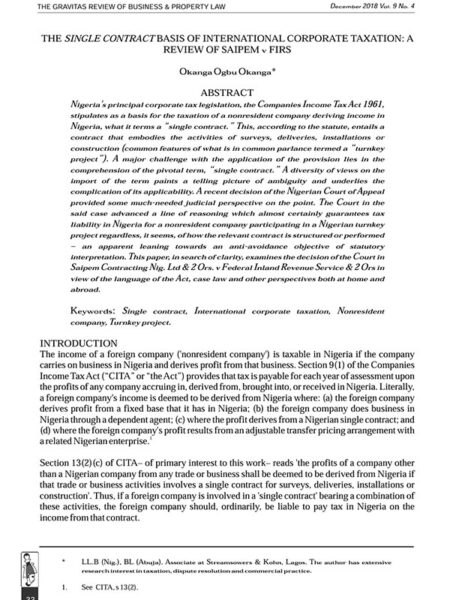
The Single Contract Basis of International Corporate Taxation: A Review of Saipem v FIRS
0₦2,500.00Okanga Okanga, Associate at Streamsowers & Kohn in his article, The Single Contract Basis of International Corporate Taxation: A Review of Saipem v FIRS, examines the tax liability of nonresident companies in single contracts, otherwise known as turnkey projects. He reviews the Court of Appeal’s decision in Saipem v FIRS to the effect that where a turnkey contract is executed by multi-jurisdictional members of a consortium, in so far as the obligations of the individual members are related components of the same project, the entire contract will be taxable in Nigeria irrespective of where the obligations of each member of the consortium were discharged. Okanga advocates a more distilling approach, like in India, such that the substantive intent of the consortium participants, rather than description, will determine liability to tax.
-
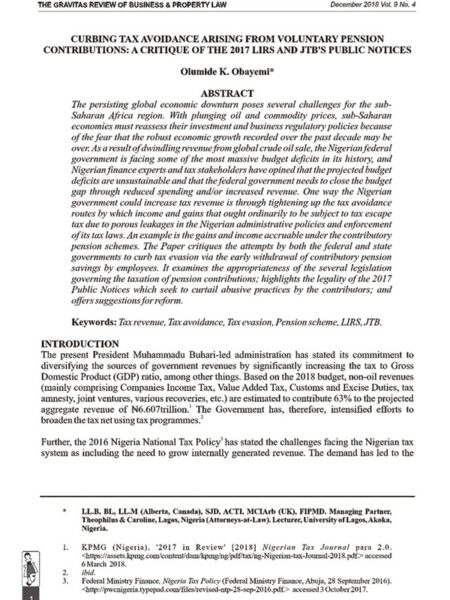
Curbing Tax Avoidance Arising from Voluntary Pension Contributions: A Critique of the 2017 LIRS and JTB’S Public Notices
0₦2,500.00Dr Olumide Obayemi of the University of Lagos in his article, Curbing Tax Avoidance Arising from Voluntary Pension Contributions: A Critique of the 2017 LIRS and JTB’S Public Notices, observes that in order to increase its revenue to fund massive budget deficits, the Nigerian governments have introduced measures to curb tax avoidance mechanisms. One of such measures by the Lagos Internal Revenue Service and the Joint Tax Board is the capping of voluntary pension contributions at 1/3 of employee’s salary and limiting withdrawals from the Retirement Savings Account. Obayemi comprehensively reviews the legality of the measure within the gamut of laws regulating pension of employees in Nigeria and advocates reforms that will enhance clarity over chaos.
-
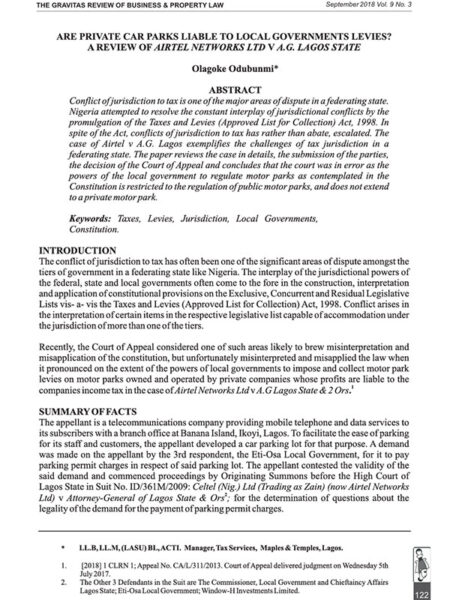
Are Private Car Parks Liable to Local Governments Levies? A Review of Airtel Networks Ltd v A.G. Lagos State
0₦2,500.00Olagoke Odubunmi, Manager Tax Services, Maples and Temples is his article, Are Private Car Parks Liable Local Governments Levies? A Review of Airtel Networks Ltd A.G. Lagos State observes that the conflict of jurisdiction to tax has often been one of the significant areas of dispute amongst the tiers of government in a federating state like Nigeria. The interplay of the jurisdictional powers of the federal, state and local governments often come to the fore in the construction, interpretation and application of constitutional provisions on the legislative powers of each tier. Odubunmi reviews the decision of the Court of Appeal in the Airtel’s case on the extent of the powers of local governments to impose and collect motor park levies on parks owned and operated by private companies for the benefit of their employees.
-
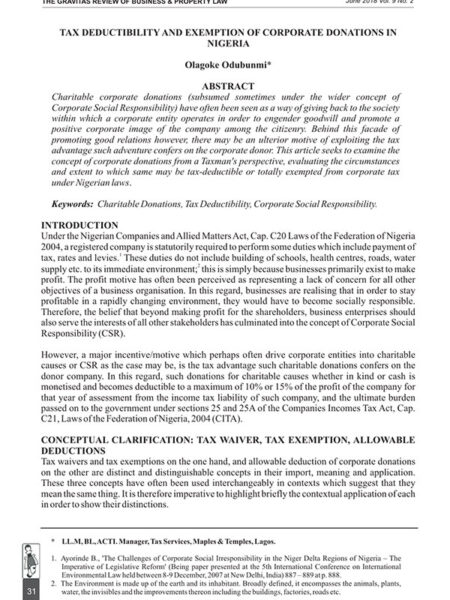
Tax Deductibility and Exemption of Corporate Donations in Nigeria
0₦2,500.00Olagoke Odubunmi, Manager, Tax Services, Maples & Temples, in his paper, Tax Deductibility and Exemption of Corporate Donations in Nigeria, notes that charitable corporate donations (subsumed sometimes under the wider concept of Corporate Social Responsibility) have often been seen as a way of giving back to the society within which a corporate entity operates in order to engender goodwill and promote a positive corporate image of the company among the citizenry. Behind this facade of promoting good relations however, there may be an ulterior motive of exploiting the tax advantage such adventure confers on the corporate donor. Odubunmi examines the legal framework for regulation of corporate donations in Nigeria. He explores the methods of making allowable and tax-deductible corporate donations, and use of charitable trusts as a vehicle for making corporate donations.
-
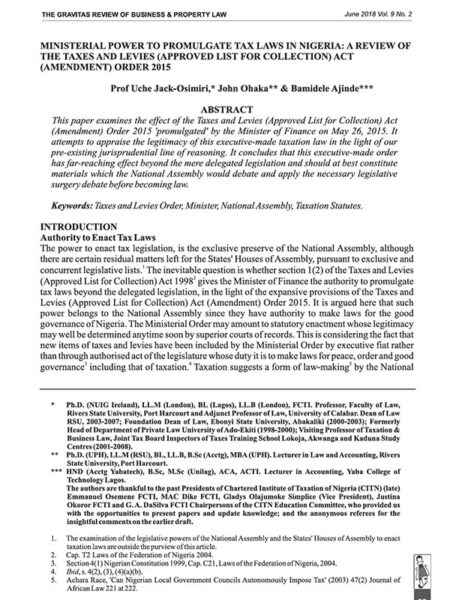
Ministerial Power to Promulgate Tax Laws in Nigeria: A Review of the Taxes and Levies (Approved List for Collection)Act (Amendment) Order 2015
0₦2,500.00Professor Uche Jack-Osimiri, John Ohaka and Bamidele Ajinde in their paper, Ministerial Power to Promulgate Tax Laws in Nigeria: A Review of the Taxes and Levies (Approved List for Collection) Act (Amendment) Order 2015 appraise the legitimacy of the Ministerial Order of 2015 in the light of pre-existing jurisprudential reasoning and case law. They posit that though section 1(2) of the Taxes and Levies (Approved List for Collection) Act 1998 provides that the Minister of Finance, may on the advice of the Joint Tax Board and by Order published in the Gazette, amend the Schedule to the Act, the Amendment Order of 2015 was shoddily done, lacks the necessary legislative rigour, and was most expansive as to belie the concept of delegated or subsidiary legislation.
-
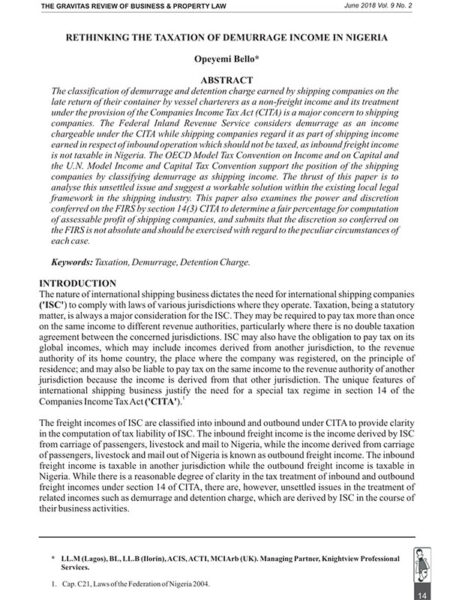
Rethinking the Taxation of Demurrage Income in Nigeria
0₦2,500.00Opeyemi Bello, Managing Partner, Knightview Professional Services in Rethinking the Taxation of Demurrage Income in Nigeria, observes that the classification of demurrage earned by shipping companies on the late return of their containers by charterers as a non-freight income, and its treatment under the provision of the Companies Income Tax Act (CITA) is a major concern to shipping companies; while the Federal Inland Revenue Service (FIRS) considers demurrage as an income chargeable under the CITA, the shipping companies regard it as part of shipping income earned in respect of inbound operation which is not taxable in Nigeria. Bello analyses this unsettled issue, and the discretion conferred on the FIRS by section 14(3) CITA to determine a fair percentage for computation of assessable profit of shipping companies, and suggests a workable solution within the existing legal framework.
-
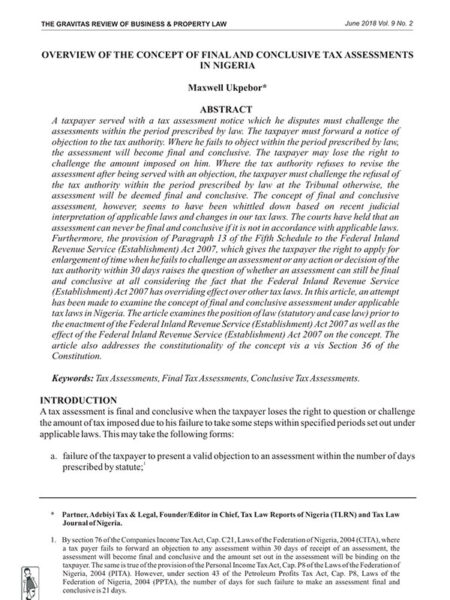
Overview of the Concept of Final and Conclusive Tax Assessments in Nigeria
0₦2,500.00Maxwell Ukpebor, Partner, Adebiyi Tax & Legal, and Editor-in-Chief of Tax Law Reports of Nigeria in his paper, Overview of the Concept of Final and Conclusive Tax Assessments, notes that a taxpayer served with a tax assessment which he disputes must challenge the assessment within the period prescribed by law otherwise the assessment becomes final and conclusive. He examines the constitutionality of the concept of final and conclusive tax assessment in Nigeria, the position of law (statutory and case law) prior to the enactment of the Federal Inland Revenue Service (Establishment) Act 2007, as well as the effect of the FIRS Act on the concept.
-
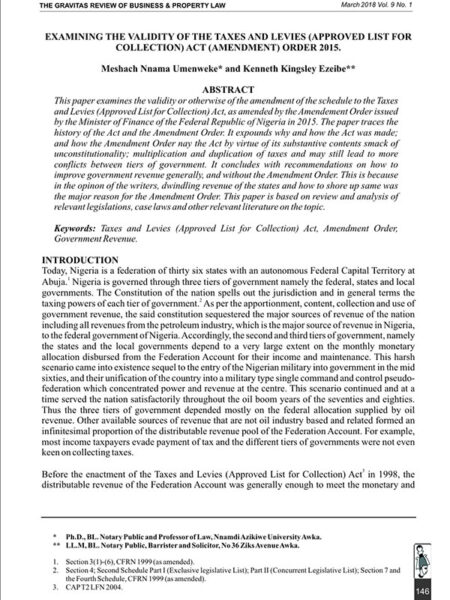
Examining the Validity of the Taxes and Levies (Approved List For Collection) Act (Amendment) Order 2015
0₦2,500.00Professor Meshach Umenweke of the Nnamdi Azikiwe University Awka, and Kenneth Ezeibe, legal practitioner, in their article “Examining the Validity of the Taxes and Levies (Approved List For Collection) Act (Amendment) Order 2015”, consider whether the Minister of Finance has the vires to amend the Schedule to the principal Act, and whether the items listed in the Order are consistent with the legislative and taxing powers of each tier of government under the Constitution.
-
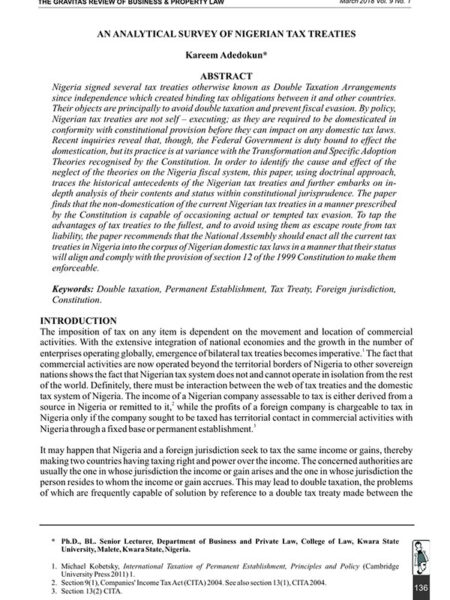
An Analytical Survey of Nigerian Tax Treaties
0₦2,500.00Dr. Kareem Adedokun, Senior Lecturer, Department of Business and Private Law, Kwara State University, in “An Analytical Survey of Nigerian Tax Treaties”,explains that Nigeria has since Independence, signed several tax treaties which created binding tax obligations between it and other countries. The objects of the treaties are principally to avoid double taxation and prevent fiscal evasion. He argues that the non-domestication of the tax treaties in a manner prescribed by the Constitution is capable of occasioning actual or tempted tax evasion. He recommends the domestication of the treaties to take full advantage of them, and to avoid them being used to escape tax liability.
The Gravitas Review of Business & Property Law



